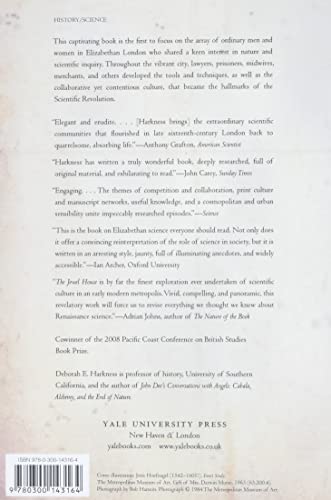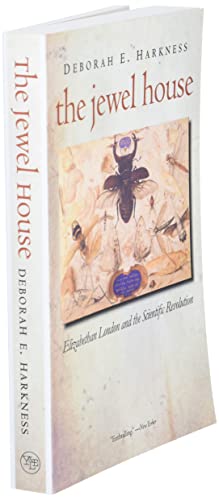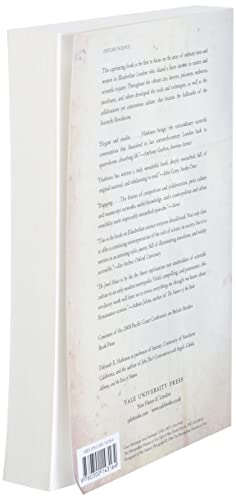




The Jewel House: Elizabethan London and the Scientific Revolution
E**N
Ethnography of Early Modern Science
As an anthropologist, I was reading this book with delight, and thinking it was just like an ethnography--to find that at the end she describes it as "an ethnography of early modern science," and cites such ethnographic luminaries as George Marcus and Bruno Latour. Indeed, this is a look at the actual culture of scientific and technical discovery in London in Elizabeth I's time. It is a real eye-opener. London at the time was swarming with technologists, herbalists, medical investigators, and every sort of inventor--not to speak of quacks, con artists and mountebanks pretending to be all of the above. The search for knowledge was downright frantic. Those of us who knew only a little about the history of early modern science knew only a tiny thin thread of this--a bit of Bacon (she cuts him down to size!) and a few others. It is striking to compare London with China at approximately the same time; Benjamin Elman, William Rowe, and others have shown a similar and equally little-known ferment there, but even their best efforts don't seem to show as much sheer originality, inventiveness, and wild-eyed experimentation in Chinese cities as London had. China never quite made the breakthrough to modern science until the 20th century. London--and, Ogilvie reminds us, the whole "republic of letters" all over Europe--had a culture of scientific advance rooted in trades, crafts, mining, brewing, fish trapping, bird snaring, everything. People were trying every new scheme to produce more. Alchemy and astrology receive due respect here. In those days, everyone knew that metallurgy could make amazing transformations; no one knew that gold, silver, etc. were primary elements that simply could not be easily transformed into each other. (People were just beginning to realize that "earth, air, fire, water" wasn't a fully adequate list of elements.) Similarly, everyone knew the sun influenced every living thing, and the moon ruled the tides; logic and common sense brought everyone to the inescapable conclusion that the other heavenly bodies must be influencing us too. The failure of alchemy and astrology was not the failure of "pseudoscience" but the triumph of reality over logic and reason--a triumph we see today, every day, as the most reasonable economic and political predictions go down in flames, ruined by human cussedness. It would be decades before Boyle could be a successfully "skeptical chemist" building on experimental proof of alchemy's failure. Early modern science was a wonderful, exciting world. I came to it after a lifetime of ethnographic research on traditional knowledge of plants and animals--in China, indigenous North America, and elsewhere. How wonderful to see an ethnography of Elizabethan London's science. For the future, one recommendation to ethnographers of early science: Look at Charles Frake's LANGUAGE AND CULTURAL DESCRIPTION as well as Latour, Marcus, et al. Frake still does the best job of explaining how to study nonwestern and traditional scientific/technical knowledge.
J**.
Wish I had the author for my history professor!
Professor Harkness has a way of presenting historical detail so smoothly that you don't realize how much you've learned. Her academic writing and historical fiction are both underscored by her obvious passion for the subject
K**R
Meticulous Recreation of Science during the reign of Elizabeth I
Fascinating and detailed study of the emergence of science, the scientific method as exemplified by the doctors, astrologers, mathematicians and craftsmen of Elizabethan England. Harkness zeroes in on specific professions and educates a lay reader about the complexities of day-to-day life of colorful personalities tiny neighborhoods and hearty stew of religious conflict and political chicanery. Brilliant period recreation and indepth analysis of the then "state of the art" of medicine, astronomy, nautical instruments and time keeping devices. A wealth of information in readable prose that brings the brilliance of the varied minds of the Elizabethan era.
A**N
Well written, snapshots of London and activities, discusses development of concept of "science"
Well written, snapshots of London and activities, discusses development of concept of "science".
O**T
Reference Elizabethian England
Good companion text to Den Harkness All Souls trilogy.
K**F
I love to read non fiction that encompasses the history of ...
I love to read non fiction that encompasses the history of science. This was a treasure trove of a specific time and place in the history of scientific methods and achievements. Not great discoveries but the day to day discoveries that made the big ones possible. I enjoyed the book.
K**M
a disappointment
I had high hopes for this book but found the chapters confusing and poorly written. The information about different people expanding knowledge during the Elizabethan age is jumbled and seemed to intent to show the failure of people working together to expand knowledge. Instead, much of the information seemed intent to show the conflicts.
V**R
Really? Can D.Harkness ever do wrong?
This is not a light tome, it is a factual account intended for a higher education audience. Having said that, somehow Ms. Harkness' style comes through and she is always an enjoyable author. Rather than a "fun" read, this is useful for those of us fascinated with Elizabethan London, particularly if we also plan to write about the subject.
L**S
What a highly fascinating book!!!
A highly accessible and compulsively readable history of science in 16th Century England. The Jewel House tells stories of everyday naturalists, engineers, alchemists, surgeons and midwifes who populated Elizabethan London at the dawn of the Scientific Revolution. Deborah Harkness does an amazing job of compiling bits of information from diverse sources, you will actually be dazzled in the amount of research she has put into this book. It’s a fascinating peek into how scientific communities develop.
A**E
Fascinating insight into Elizabethan London. Deoborah Harkness writes in a way that makes the subject come alive.
I am alway impressed by the dedication of a historians' broad knowledge and years of hard graft that must go into researching this kind of work to achieve that knowledge. Deborah Harkness excels at this and more - she allows the reader into a world of science. The term 'science' was little used then in the way it is in our contemporary world, and the deep and interesting explanations and journey through the discoveries of the Elizabethan age, makes for compelling reading. I wish history had been this interesting and revealing when I was taught it at school. Thank you for writing it - I am (slightly) wiser from reading it.
K**5
Factual, accurate, interesting
Great book. D . Harkness if a fantastic scholar and author
D**R
A fascinating read
This is a great book which really opens your eyes to Elizabethan London. I would recommend that everyone reads this at one time or another to broaden understanding of this time period.
M**T
can also recommend Deborah Harkness's fantasy fiction
Paints a realistic image of the period, most enjoyable, can also recommend Deborah Harkness's fantasy fiction, which all have the same lovely historical texture.
Trustpilot
1 day ago
4 days ago